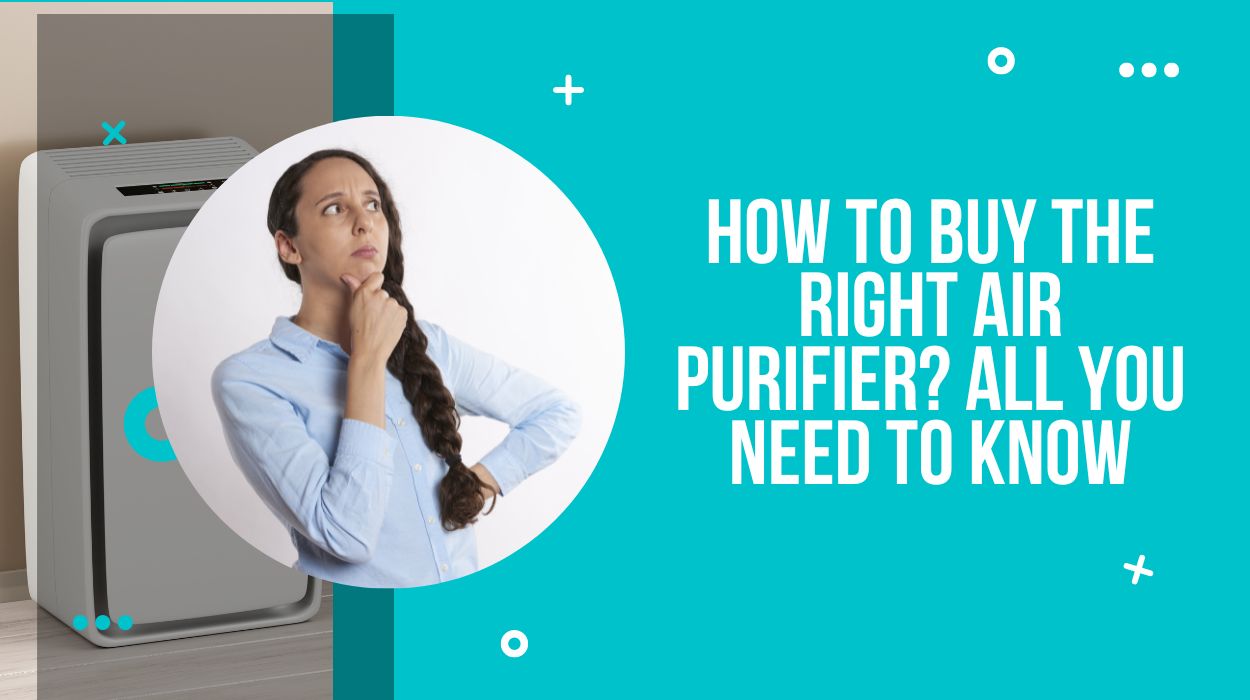Do you live in cities like Delhi, Mumbai, Bangalore, Kolkata, or Pune? If so, then you will know the need to have a good air purifier. According to IQAir, India is ranked as the third most populated country in the world. But most people forget that pollution is not just an outdoor phenomenon. Reasons like smoke, mold, bacteria, mites, stoves, or pet hair pollute indoor air.
Indoor pollution can lead to numerous health problems such as allergies, asthma, premature deaths, lung cancer, and other respiratory problems. Don’t worry- in this article, we will give you a clear idea regarding the features required in a good quality air purifier. You will also understand what an air purifier is, different types in the market, pros and cons and so on.
What Is An Air Purifier?
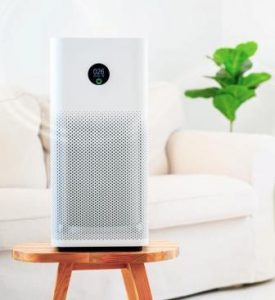
An air purifier is an air cleansing device used at home, in offices, schools, industries, etc. But there is a difference in performance for both the professional models used in industries and the domestic models used at home or in small offices. An indoor air purifier filters and purifies the air in the enclosed space. To be specific, it can capture up to 99.7% of all microscopic air pollutants.
However, there are a few poor quality air purifiers in the market, i.e., they produce secondary pollutants while purifying. So, while purchasing, ensure you buy air purifiers of good quality.
Why Do We Need It?
If you think the air inside your home is clean, then you are wrong. Polluted air results from mold, bacteria, stove, smoking, usage of deodorants, cleaning agents, and so on.
An air purifier gets rid of allergens, pollen, dust, fur, unpleasant smell from paints, or any other minute particles thus, keeping the air clean. It helps to reduce allergies, and asthmatic triggers, lesser dust accumulation, and mites eliminate molds and different nasty smells like smoking.
In short, you need it for better and cleaner air without minute pollutants that can trigger health problems. Or if you have allergies, asthma, smoky surroundings, and pets.
4 Different Types Of Air Purifiers
Air purifiers are differentiated based on the type of filter they use for air purification. In India, there are mainly four types of air purifiers. They are listed below.
1. HEPA Filters
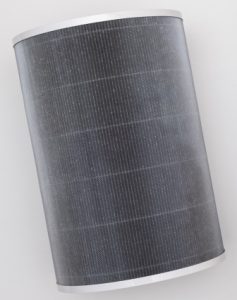
A True High-Efficiency Particulate Air (HEPA) filter is a high-performance mechanical filter that can remove about 99.97% of all microscopic particles as tiny as 0.3 microns. However, other HEPA filters in the market known as “HEPA-type” or “HEPA-like” are inferior products and can only capture particles as small as 2-5 microns.
It has an intense four-step purification process- pre-filter, specially treated carbon filter, antibacterial coated HEPA filter, and Air Ionizer. HEPA filters can remove pollutants like pollens, molds, spores, fungi, pet hair and visible smoke but it does not remove lousy odor, chemical fumes, or harmful gases.
You can use HEPA filters for a year, but the filter replacing process is costly.
2. Activated Carbon Filters
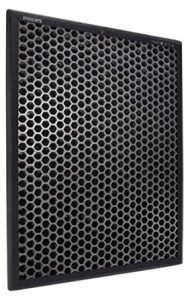
As the name suggests, this filter uses a unique activated carbon with tiny absorbent pores. The difference between HEPA filters and activated carbon filters is that while the former can capture particles, an activated carbon filter is best for trapping fumes, gases, and foul odors. This is one of the healthy cleaners that do not release contaminated secondary pollutants into the atmosphere.
So, this type of filter can capture and purify chemical gases and fumes, cooking order, the smell from smoke, paint, varnish, and even pets. The downside is that particles will still be present, which means that health problems will still prevail. Activated Carbon filters usually last for three to six months and need to be replaced from time to time.
3. Ozone Purifiers
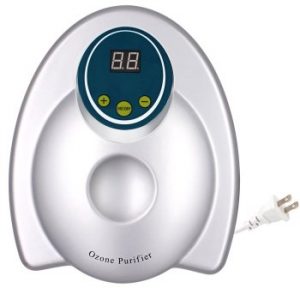
Ozone purifier release ozone at regular intervals as ozone kills bacteria, viruses, and other harmful microorganisms. Many ozone purifiers are relatively cheap, but they are extremely dangerous. We have learned that ozone is a toxic gas and can cause respiratory and other health problems. Avoid these at all costs! So, if you see cheap cleaners, make sure that it is not an ozone purifier as it is hazardous and has serious side effects.
4. Air Ionizers
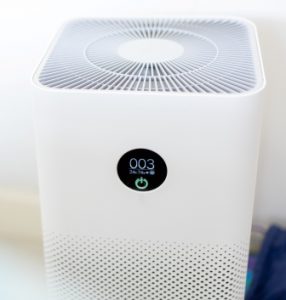
This is another cleaner that you should avoid. It does not directly release ozone into the air, but air ionizers release it in a small quality as a by-product. An air ionizer emits charged ions into the atmosphere, and these ions stick onto the air particles or contamination present. This makes the air particles stick onto solid surfaces.
The particles are not eliminated, just displaced. However, these pollutants fallen on solid surfaces can be collected on an electrostatic plate, but even this requires extreme care and frequent cleaning. So, if you have a choice, avoid air ionizers as well.
Features Required In An Air Purifier (Points To Consider While Purchasing)
There are certain features that are a must in every good-quality air purifier. Written below are a few of those features that you should consider before buying an air purifier.
1. ACH And CADR
ACH and CADR are two rating systems that you will come across while buying an air purifier. ACH or Air Changes per Hour gives you the number of times the air changes in the room per hour. So, if the number is higher, the more efficient the machine is at its job.
CADR or Clean Air Delivery Rate informs how effective the machine is in the purification process. Choosing an air purifier with a CADR rating is always good as it gives an honest and accurate assessment regarding how much space the purifier can clean. Just like ACH, the higher the number, the more efficient it is.
2. Filters
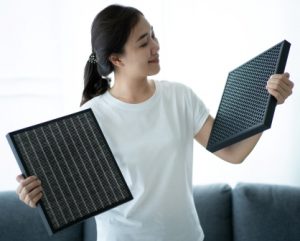
An air purifier can have different types of filters like
- Pre-filter- Eliminates large particles like pet hair before the second filtration process.
- True HEPA- As mentioned above, it filters minute particles up to 0.3 microns, but it does not get rid of the bad smell.
- Activated carbon filter- It has activated carbon or charcoal, which helps in absorbing the foul odor. However, it will not purify dust particles.
- Antibacterial and germicidal filters- It helps to kill bacteria and other microorganisms that cause harmful respiratory problems.
While buying an air purifier, make sure there are at least three filters mentioned above. This will ensure that the purification process is happening efficiently. There are also other filters like UV filters, Charged Media filters, and Photocatalytic Oxidation filters. There is not a must, but the more the filters, the better the process.
3. Operating Cost

Always check the operating and maintenance cost before purchase. Roughly, an activated carbon filter needs to be changed once every three months, and is considered as a low-budget purifier. HEPA filters are comparatively more expensive.
Before purchasing, check how much they charge for home services and how much the spare parts cost. Also, make sure that the spare parts will be available in the market for the next five to ten years.
4. Placement And Room Size

If you want to make the best use of your air purifier, place it where it’s the most contaminated. The placement and purchase of a purifier also depend on the room size. Check the square footage rating mentioned on the purifier and compare it with the size of the room. Choose one that has a higher or at least an equal square footage rating as to your room.
5. Noise Level
Good quality purifiers usually have a fan installed within to pull the air into the filters. Some of these fans are relatively louder than the others. So choose one based on the placement of these purifiers.
6. Customer Service And Warranty
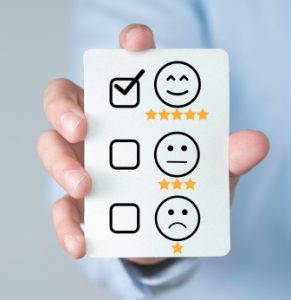
This is very important if you value your money. You need to change the purifier components within the first year of the purchase or between 12 to 18 months. So, make sure there are good follow-up and after-sales services like customer care and warranty.
Tip: Always check customer reviews before the purchase of any product!
Pros And Cons Of An Air Purifier
There are both pros and cons to an air purifier, and you should know them before purchasing.
Pros
- Since pollutants are captured, it reduces allergies and asthmatic problems.
- It helps to reduce the chances of airborne diseases.
- It can also increase life expectancy as there is a lesser chance of infection.
- Air purifiers eliminate harmful chemicals.
- It absorbs unpleasant odors and neutralizes the smell.
Cons
- Need to spend for regular maintenance, which can be costly.
- The air quality worsens if the old filters are not changed.
- All air purifiers are not quiet.
- Air purifiers that use activated carbon filters do not remove the pollutant, while HEPA filters do not remove the odor.
- Certain air purifiers produce secondary pollutants like highly harmful ozone.
You May Also Like To Read:
Best Water Purifier for Home Use
Takeaway
Air purifiers help cleanse the pollutants and odor in your home. In our current situation, I believe that it is essential to have a good air purifier at home. But while purchasing, check the features, filters, ACH and CADR rating, and customer review. Comment and let us know the changes an air purifier has brought about in your home.

